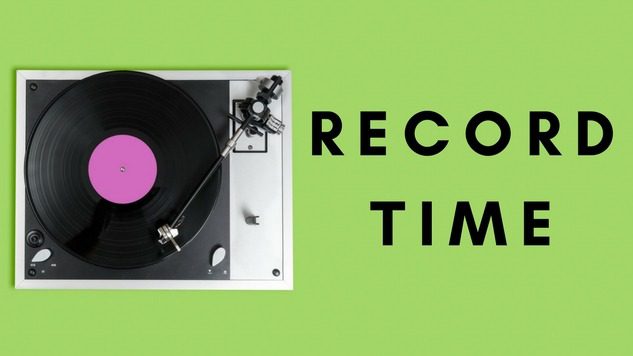There’s something undeniably alluring about the rise and fall of rock stars that’s stood the test of time. Whether it was the hysteria of Beatlemania in the ‘60s or the advent of grunge in the ’90s that had kids suddenly bleaching their hair and donning oversized denim jackets, the way certain bands have come to define generations is captivating. On their latest album, Household Name, Momma take a look at what it means to make it big.
On their follow-up to 2020’s Two of Me, founders Etta Friedman and Allegra Weingarten decided to take a more personal approach to songwriting. At the time they were experiencing polar opposite ends of young love—Weingarten opted to write about heartbreak, while Friedman had recently moved in with their long-term partner. The duality of their experiences is offset by the recurring theme of fame and the tropes in the music industry they explore.
One of the initial songs they wrote for the record was “Rockstar,” a riff-heavy track inspired by a Tenacious D documentary and their obsession with becoming “The Best Rock Band of All Time.” In the early stages of writing and demoing the album, Momma also became intrigued by the grip Nirvana’s 1991 album, Nevermind had on society.
“The way that Nevermind completely affected an entire culture of people and youth was insane and super fascinating to us. We loved the idea that back in the day, people cared so much about rock and roll bands,” Friedman says. “I think that we were just fascinated by the fact that society was moved by music that wasn’t just popular music or pop music. It was like rock, indie rock, and guitar music and things like that.”
Across 12 heavy-hitting tracks, Momma assert that they’re not just seeking out their 15 minutes of fame—they’re shooting to have the larger-than-life, almost mythical success of their idols. Household Name is nostalgic, yet innovative, as they take inspiration from iconic artists like Liz Phair, The Breeders, Smashing Pumpkins, Pavement and Veruca Salt. While some songs are clear nods to their heroes (like “Lucky,” which was directly inspired by Liz Phair’s “Nashville”), Momma make it clear that they’re not trying to become the next Nirvana or Pinback—they want to establish their own sound.
Despite their ambition, Momma still have a carefree radiance, evident on the breathless joyride that is “Speeding 72,” or the addictive, starry-eyed first single “Medicine.” They don’t push themselves to fit into the rock band archetype or make a record that isn’t an accurate reflection of what they want to say just to guarantee a chart-topper. Instead, they embrace the rough edges of their self-taught playing skills and all of the emotions that come with being a 20-something chasing a dream.
“We don’t really look at music or songwriting from a music theory standpoint at all, or from a very methodical standpoint. I think a lot of it is just instinct and feeling,” Weingarten says. “A lot of the guitar parts we write have nothing to do with, ‘I’m playing this because this is the fifth on this chord,’ like, I have no idea what that means. It’s just very instinctive, and that just comes from a place of, ignorance almost, which I think is a cool thing.”
This unabashed authenticity is rife throughout Household Name, due in part to the band’s shift away from abstract imagery and towards writing more autobiographically. While many of the songs on the album went through different iterations and come from fragments of voice memos from years ago, there’s a sense of cohesion that Weingarten and Friedman attribute in part to Weingarten joining Friedman and their third member, Aron Kobayashi Ritch, in New York City.
The band spent over a year demoing the album, and eventually recorded split between Studio G in Brooklyn and Ritch’s home studio in Mar Vista, Los Angeles. Living up to their burgeoning rock star status, every night the band would wrap recording, get drinks at the Broadway, and show up bright eyed and exactly on time the next day to do it all again.
While many of the most legendary bands have been accused of becoming sell-outs or compromising their sound just to please label execs, Momma make it clear that honesty is at the center of their songwriting. Whether they become a cult classic or quite literally a household name, their anthemic tracks have an urgency and intimacy that they intend on preserving.
“Whenever you write, it has to be honest,” Weingarten says. “Even if you aren’t personally feeling those things that you’re writing, as a lyricist, it still has to be honest, and it has to mean something.”
Samantha Sullivan is a Paste Music intern and writer based in Philadelphia. She can be reached on Instagram @fangirlpurgatory.




